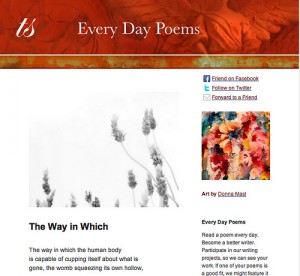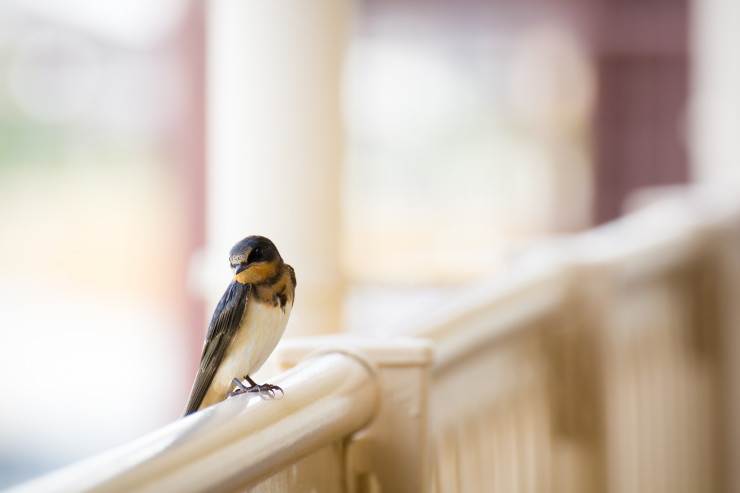Just done with teaching, I’m sailing down the highway toward summer vacation when an (okay, somewhat hokey) acronym flies into my head: L. I. F. E. — Literature Is For Everyday. Though I plan to leave even the memory of grading and committee work at my office, I can’t — of course — leave literature. Yes, it’s one of the subjects I teach; it’s also, as a writer, what I “do.” Beyond that, however, literature is who I am. It camps out in my brain. It travels with me day in and day out. In many ways, it’s who all of us are in our everyday lives with our everyday routines, struggles, adventures, and epiphanies.
Let me explain. As I tell my students at the beginning of every semester, I see literature not as an escape from but rather as a confrontation with reality. To me, it has very much to do with our day-to-day experiences; it also has very much to do with the arc of our lives: our fears, hopes, temptations, and dreams. As Flannery O’Connor and others have explained, reading and writing literature is a way of finding out what we think. Often, it leads us to discovery by bringing us face-to-face with ourselves and with the world.
Perhaps this is why I’m such a fan of T. S. Poetry’s Every Day Poems and the actual name of the resource—Every Day, a term I associate not just with frequency but with ordinary, everyday moments. Even here lives epiphany. Especially here lives epiphany. When a poem appears in my in box, it not only prompts me to slow down and relish the potency of poetry, it also reminds me how much those words detail and intersect with our daily lives.
For example, just yesterday, with one click, Audre Lorde’s Coal, an evocative meditation on identity and the power of language, materialized before my eyes: “How a sound comes into a word, coloured/By who pays what for speaking.”
Or, a few weeks earlier, Mary Ruefle’s poem, The Hand, popped up. With the first line — “The teacher asks a question” — suddenly I’m in the present tense of the poem; I’m the student knowing the answer but more interested in what’s beyond the classroom: “Outside the window, on an overhanging branch, /a robin is ruffling its feathers/and spring is in the air.”
And then there are the poems that respond to literature, those that force me to think more deeply about the world around me, and those that just make me laugh out loud. Mark Jarman’s Victims does all three. Through the Twitter companion, #DipIntoPoetry, I even get a glimpse into which lines affect others in this reading/writing community.
I’ve been thinking a lot lately about how stories mark and mirror our lives, how the choices, themes, and perspectives of such works as Chinua Achebe’s Things Fall Apart, Flannery O’Connor’s Good Country People, Nathaniel Hawthorne’s Young Goodman Brown, and Virginia Woolf’s To the Lighthouse take me beyond the lives of the characters into my own or my neighbors’ lives, even when those “neighbors” live in another century or hallway across the world. By “thinking a lot lately, ” I was surprised to realize I really mean “decades”; I really mean “much of my life.” Like many of us, that’s how long I’ve been writing about and responding to literature. This love affair is life-long. The rhymes of the nursery accompany us all the way to the nursing home. The epiphanies both of youth and old age sprout more often than not from something we’ve read. The past and present engage in conversation.
I was reminded of this one afternoon while teaching Gerard Manley Hopkins’ poem God’s Grandeur. Because I live in Central Pennsylvania, fracking and the gas industry make headlines often. The 19th-century environmental issues in Hopkins’ poem speak to my students’ Central Pennsylvania reality. When we look together at the problem/solution structure of this Italian sonnet — where industry sears the earth — we also see local controversies and the desire for something more. In the following poem, I try to capture this yearning for renewal and epiphany.
“And the Topic for Today is Environmentalism. . . .”
Teaching “God’s Grandeur”
More politically correct than divine grandeur,
it too flames out in this small Pennsylvania town
where fracking hijacks the headlines. Good reason
and good enough to bring the state students trodding
heavily into a poem piled high with God and earth,
with “responsibilities” they hear each morning
as the gas industry trucks rattle past our windows,
their tired drivers knowing nothing
of iambic pentameter or sestets but much
about food on the table, a steady job.
The freshmen, eager now,
blurt out dilemma, paradox, instress—
and all those other new-sounding ideas
suddenly connected to their lives,
their parents, the sonnet
they think was written last week,
even with its 19th century,
sound-packed syllables they don’t get
until slowing down, thinking.
And so—after playing with light, foil, sound;
the way trade “sears, ” “blears, ” and “smears”;
and how and why shoes separate us from ground—
we detour to Genesis, Cat Stevens, and a heavy metal rendition
that almost drowns out Hopkins with bass.
All this before rounding the terrain-raked bend
to solution, which is what—they are surprised to discover—
we all most want: the eloquent octet, the bright wings,
the ah! that opens the mind to talk,
at long last, about the holy.
And talk we do, my students and I, about the past, about the reality of our current lives, about how both are intricately woven together by the epiphanies we witness every day through the written word.
Photo by t-mizo, Creative Commons, via Flickr. Post by Marjorie Maddox, Director of Creative Writing and Professor of English at Lock Haven University and author of True, False, None of the Above.
__________________________

Read a poem a day, become a better poet. Simplest way to make your day, with an excellent poem a day.
Hand-selected poems. Monthly themes.
Convenient Monday to Friday inbox delivery.
- The Secret of Literature: Everyday Epiphanies - July 29, 2016
- How to Write a Ballad - September 5, 2014
- Ode to the Ode - March 7, 2014

Bethany says
Beautiful piece, love how you flesh out the connection between older literature and our current day struggles and passions.
And I have to say, I just love that phrase: “a poem piled high with God and earth[.]”
Marjorie Maddox says
Thanks so much, Bethany. Yes, I love the way literature from the past continues to speak about and to our everyday lives. That’s much of what this new book is about. 🙂
Laura (L.L.) Barkat says
We are definitely on the same page with you about poetry (and literature!) for life 🙂
And, yes, like you, I think many of my epiphanies come from things I read. So I’ve been reading even more than I used to, as a kind of epiphany-stirring practice.
Marjorie Maddox says
“Epiphany-stirring practice”—what a wonderful phrase!